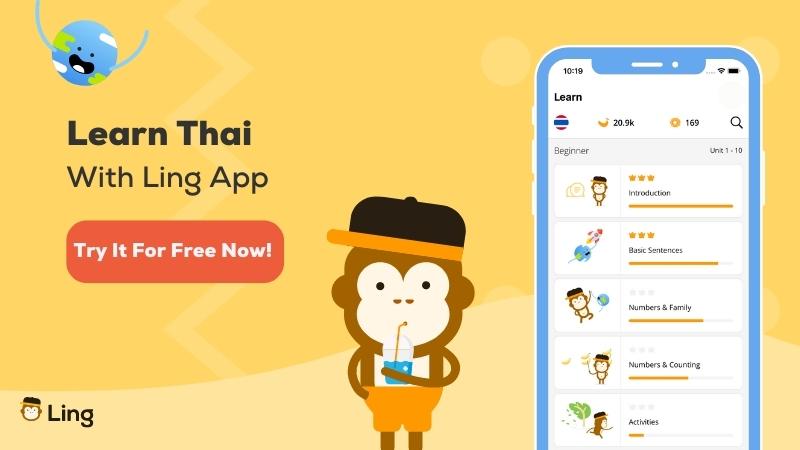Sawadee ka! If you’re reading this, you’re probably interested in different ways to learn Thai. But did you know that Thai is a tonal language? This means the same word can have different meanings depending on the tone. Don’t worry, though – with the right approach, you’ll see that speaking Thai is pretty easy.
But before we dive in, let’s talk about why learning Thai is essential.
First, Thai is Thailand’s official language, attracting millions of visitors yearly. So, knowing the language will make your travels smoother and allow you to interact with the locals and gain a deeper understanding of Thai culture.
Learning a new language is also great for your brain! It improves your memory, enhances your creativity, and can even delay the onset of dementia.
Now, let’s be honest – learning Thai can be challenging. It’s a tonal language with its own unique writing system. The good thing is we’ve got ways to make the learning process easier and more enjoyable. Fair enough? Let’s get started!
1. Face-To-Face Language Courses
If you’re looking for a structured approach to learning Thai, enrolling in a language course might be the way to go.
Language courses provide a comprehensive curriculum covering all language aspects – from grammar to vocabulary to pronunciation.
These face-to-face courses are designed with specific learning objectives, catering to different skill levels and needs.
For instance, beginners can learn the Thai alphabet, while more advanced learners can focus on conversational skills for everyday situations.
Pros:
- Provides a structured and comprehensive approach to learning Thai
- Offers access to qualified teachers who can guide you through the learning process
- Gives the opportunity to practice speaking and to listen to classmates
- Provides a prescribed curriculum covering all aspects of the language
Cons:
- Can be expensive
- Requires a commitment to a set schedule
- Limited flexibility to focus on specific areas of the language
- May have limited opportunities for self-directed learning
So, if a structured and immersive approach is your thing, a language course may be the perfect fit for you. Just do your research and choose a course that meets your needs and budget.

2. Online Courses
Now, if you prefer a more flexible and self-paced approach, online courses might be the perfect option for you.
These offer a variety of learning materials like videos, audio files, and interactive exercises you can access anytime and anywhere.
There are many online Thai courses available, ranging from free to paid courses. Most have gamified language learning experiences, and some websites offer more comprehensive and structured lessons.
Pros:
- Flexibility in terms of scheduling and pacing
- Access to a wide range of learning materials
- Can be more affordable than traditional language courses
- Can be done from the comfort of your own home
Cons:
- Lack of direct interaction with a teacher
- Limited opportunities for speaking and listening practice
- Requires self-discipline and motivation to stay on track
- Quality can vary widely between different online courses
If you’re interested in trying an online course, then you must educate yourself first by researching and reading reviews to find one that fits your needs and learning style.
3. Language Exchange Programs
In a language exchange program, you’ll be paired with a native Thai speaker who wants to learn your native language.
You’ll take turns practicing each other’s languages, providing feedback, and correcting each other’s mistakes.
This improves your language skills and helps you learn the culture and lifestyle of the person you speak Thai with.
Pros:
- Exposure to authentic Thai language and culture
- Opportunity to practice speaking and listening with native speakers
- Chance to make new friends and build a network
- Usually free or low-cost
Cons:
- Can be challenging to find a language exchange partner who meets your language learning needs
- May not have access to a qualified teacher who can provide feedback and correction
- Requires a level of social confidence and willingness to engage with strangers
Remember, the key to success with language exchange programs is to be committed and dedicated to the process.
Always set realistic goals, communicate regularly with your partner, and be open to feedback and constructive criticism.

4. Language Immersion Programs
Language immersion programs are like jumping into a Thai language and culture pool, except instead of water, you’re surrounded by Thai people, food, and way of life.
These programs are designed to give you a fully immersive experience where you’ll live with a host family or stay in a dormitory with other students.
You’ll also get to participate in various cultural activities and excursions, like visiting local markets, cooking Thai food, and exploring historical landmarks.
Pros:
- Accelerates language learning through an immersive experience
- Provides a chance to fully immerse in Thai culture
- Offers a fun and exciting way to learn a new language
- Ideal for those who learn better through experience and practical application
Cons:
- Expensive, particularly for longer programs or those with accommodations
- Requires a significant commitment of time and resources
- Adjusting to living in a foreign country can be challenging for some students
- Not available in all locations, making it less accessible for some learners
As you can see, language immersion programs are a good option for those looking to learn Thai in a fun and exciting way. Still, you should carefully consider the pros and cons before committing to a program.
5. Practice With Native Speakers
One of the effective ways to learn Thai is by practicing with native speakers. This approach involves finding someone who speaks Thai as their first language and conversing with them to practice your speaking and listening skills.
You can find native speakers through language exchange websites, social media, or by attending language meetups in your area.
Pros:
- Provides the opportunity to practice speaking with someone who speaks Thai fluently
- Helps improve listening skills and comprehension by hearing spoken Thai naturally
- Can be a fun and interactive way to practice Thai
- Can provide insights into Thai culture and way of life
Cons:
- It can be difficult to find native speakers who are willing to practice with learners
- Some learners may feel self-conscious or nervous speaking with a native speaker
- Can be time-consuming to find a suitable language partner
By conversing with someone who speaks Thai fluently, you’ll get a real sense of the language’s rhythm and nuances and gain valuable insights into Thai culture and way of life.
Although finding the right language partner can be challenging, it’s worth the effort to seek out those willing to help you.

6. Using Thai Textbooks
A Thai textbook can be a helpful way to learn Thai, especially for beginners just starting to learn the language and the Thai script.
These textbooks typically cover Thai grammar, vocabulary, and sentence structure and often come with exercises and audio materials to help with practice and comprehension.
Pros:
- Provides structured Thai lessons and exercises to help learners progress in a logical way
- Can be used at your own pace and on your own schedule
- Often come with audio materials to help with listening and pronunciation
- Can be more cost-effective than hiring a tutor or attending a language school
Cons:
- Can be dry and boring for some learners
- May not provide enough opportunities for speaking and listening practice
- Some textbooks may not be up-to-date with current language usage and slang
Remember to choose an up-to-date textbook with current language usage and slang. Also, find one that suits your learning style and needs, and supplement it with other resources for a well-rounded language learning experience.
7. Visit Thailand
Traveling in Thailand can be beneficial for learning Thai for a few reasons. Firstly, it allows you to immerse yourself in the language and culture on a daily basis, just like in a language immersion program. You’ll be constantly surrounded by the Thai language and be able to practice your skills practically and naturally.
Also, being in Thailand allows you to interact with native speakers and practice your speaking and listening skills in a real-world setting.
Pros:
- Provides a fun and engaging way to learn Thai
- Offers the chance to practice Thai in a real-world setting with native speakers
- Allows you to experience Thai culture and customs firsthand
- Can be more cost-effective than attending a language school in your home country
Cons:
- Can be expensive, especially if you need to cover the costs of travel and accommodations
- May not be feasible for everyone due to time and financial constraints
- Could be overwhelming for some learners to adjust to a new environment and culture
By experiencing the language and culture firsthand, you’ll be more motivated to continue practicing and improving your Thai skills. And it’s a great excuse to explore a beautiful country and have an adventure!

Useful Words And Phrases For Learning Thai
Learning some basic words and phrases in Thai can be incredibly helpful when traveling to Thailand or when learning the language.
These conversational Thai phrases can help you communicate with locals and show interest in their language and culture. Here are some of them:
The phrases listed above are commonly used in everyday conversations. They can be used to start conversations or ask for help when needed.
With practice, you can easily remember these Thai words and build upon your knowledge to become more fluent in Thai.

Incorporate The Ways To Learn Thai With Ling App
With various ways to learn Thai, it’s essential to find the methods that work best for you. Whether it’s through immersion, textbooks, or speaking with native speakers, consistency and dedication are key.
And why not complement those methods with a fun and effective tool like the Ling app? With interactive games, quizzes, and an AI chatbot to answer your questions, the Ling app makes language learning enjoyable, convenient, and effective.
Download the app from the App Store or Google Play today!




































































